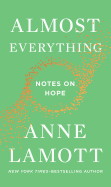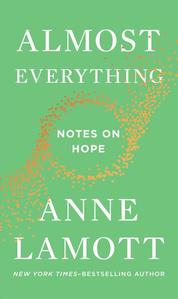
 "Some days there seems to be little reason for hope, in our families, cities, and world," admits essayist Anne Lamott. "Well, except for almost everything." That exception is the impetus for Lamott's essay collection Almost Everything: Notes on Hope. Lamott, who has made a career out of facing the darkness honestly and then looking for the pinpricks of light, brings her pithy, self-deprecating humor to bear on such topics as a friend's alcoholism, the power of stories to redeem and transform and the ways grace sneaks in: without warning and against all expectations.
"Some days there seems to be little reason for hope, in our families, cities, and world," admits essayist Anne Lamott. "Well, except for almost everything." That exception is the impetus for Lamott's essay collection Almost Everything: Notes on Hope. Lamott, who has made a career out of facing the darkness honestly and then looking for the pinpricks of light, brings her pithy, self-deprecating humor to bear on such topics as a friend's alcoholism, the power of stories to redeem and transform and the ways grace sneaks in: without warning and against all expectations.Lamott (Hallelujah Anyway) begins by confessing, "I am stockpiling antibiotics for the apocalypse, even as I await the blossoming of paperwhites on the windowsill in the kitchen." In brief, wry chapters on topics such as "Puzzles" (not the 500-piece kind), "Humans 101" and "Famblies," she explores the complicated truth of "the mess and the tenderness"--the ordinary human condition, shot through with despair and joy. This takes the form, at times, of sticking with friends and family members through illness and death, learning to treat ourselves and our bodies with kindness and struggling not to give in to hate in a fear-filled political climate. It also can mean glancing out the window at a bird, laughing (kindly) at ourselves and simply being willing to be amazed.
Through rambling anecdotes from her life and the writing classes she teaches, Lamott comes back to a few key truths: every human being is valuable; stories teach us to hope and hold us together; and this life is full of joy and beauty, which often appear right after we've almost given up. The chapter on writing harkens back to her classic Bird by Bird, with its emphasis on plain hard work, sticking to the truth of a story (even a fictional one) and keeping an eye out for the telling or magical detail. "We have to cultivate the habits of curiosity and paying attention," Lamott says, because they are "essential to living rich lives and writing."
On the days when "it doesn't feel like the light is making a lot of progress," Lamott also recognizes that "love has bridged the high-rises of despair we were about to fall between." Fortunately for Lamott's readers, this book, like her others, is both a celebration of that bridge and a gentle but insistent call to keep building. --Katie Noah Gibson, blogger at Cakes, Tea and Dreams
Shelf Talker: Anne Lamott's essays on hope offer pithy, straight-shooting insights in times of despair.

